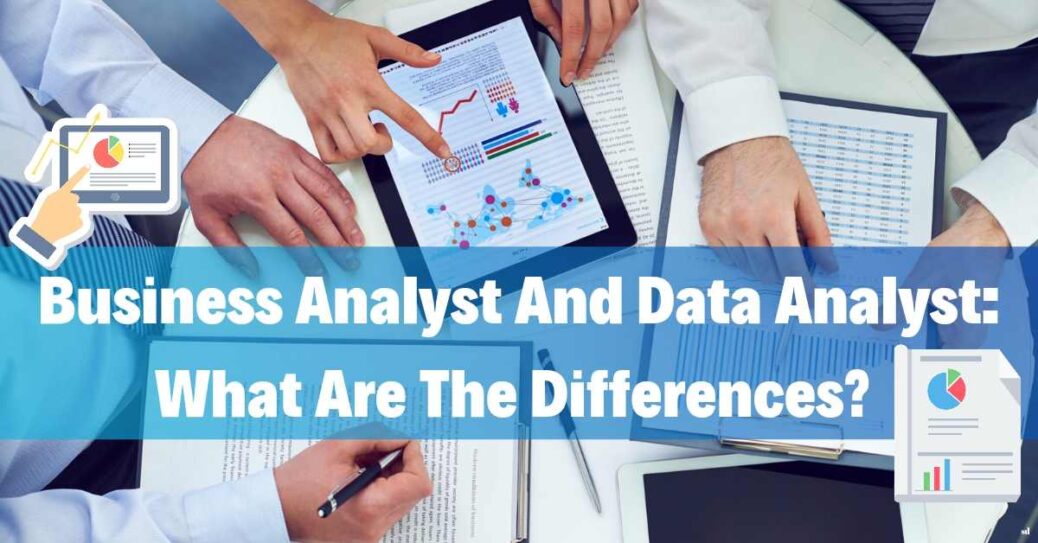Business Analyst and Data Analyst: Data Analyst and business analyst job description. Saying there is no difference is a common mistake companies make. What is the correct description? The mystery is now solved. Let’s dig in.
Table of Contents
Business Analyst And Data Analyst: Is There A Difference?
A Business Analyst (B.A) monitors all aspects of the firm to verify that it is managed and develops. You can expect to establish, develop or maintain key metrics, also known as KPIs (Key Performance Indicators).
For example, you must put out quantitative work to be able to make important decisions about a sales process or a product improvement.
You’ll look at both the internal and exterior aspects of the firm, looking for flaws in the process that will assist the company to become more effective and profitable.
There are some tools you will use like SQL, visualization tools like Tableau and you will present the findings to the stakeholders. This role is customer- focused, even if the “customer” is internal.
This explanation may have brought the Data Analyst to your mind. Nevertheless, there are certain distinctions in the Data Analytics profession, as well as specific talents and objectives for this position. So let’s solve the mystery.
Business Analyst : Make The Right Choice For Your Career.
Data rules the modern world. Data analytics exists wherever there is technology. If your target is the bull eye you intend to make better decisions; you need to learn to use this big data. Of course you have to collaborate with experts to deal with it.
Frankly, Data analytics exists in every business: Business world, IT management, engineering, scientific research you, do the math.
In three years, data science will grow almost eight times. This means that the industry will reach approximately 20 billion dollars. This should mean something to you; ringing a bell?
If you want to understand how big the event is, look at the number of queries people make on search engines like google. There are almost a hundred thousand queries per second, and about two trillion queries per year.
Business Analyst And Data Analyst: Differences, Similarities, Roles
If we’re talking about analyzing datasets, finding the right human trends, and using them for the company, we’re describing a data analyst.
Excellent problem solvers, resourceful communicators, and critical thinkers are business specialists.
Common Features Of Both are:
Both have detailed information. This detailed information is necessary for the company to make the right decisions.
They identify problems accurately and moreover, they produce and implement solutions for these problems.
Some Skills Of A Business Analyst:
Business analyst job description: SQL , Excel, Tableau (or similar visualization tool),sales team
Other CRM tools, deep dives, KPI analysis
Presentation / face to face meeting / stakeholder meetings
Some goals of a B.A
Monitor the health of the business, improve business metrics.
B.A usually hold a bachelor’s degree in a business-related discipline such as accounting, finance, or economics.
Proficiency in data analysis, Expert analytic ability and a mathematical mentality
The capacity to research and find important data
Some Skills Of A Data Analyst:
SQL, R and Python (sometimes)
Tableau (or other visualization tools), data architecture
Troubleshooting data, routine reporting, Identifying data anomalies, Identify errors in data
Some Goals Of A Data Analyst: Protection of company data, Presenting data and metrics for other roles in the business
Differences
A Data Analyst (D.A) will retrieve the data
A Business Analyst (B.A). uses this data to make business decisions
A Data Analyst will collaborate with the company’s technical staff more. Another One will be more cross-functional by working with stakeholders
A Data Analyst will concentrate on SQL and data tables more than anything else. Another will focus more on the metrics themselves and visualize them, meets with a client face to face
They Collaborate With: Departments of information technology, Teams in charge of data handling, Scientists that work with data
How To Become A Data Analyst?
People who want to be data analysts have the opportunity to practice the profession of data analyst by graduating from the relevant faculties of universities, such as Computer Science, Mathematics, Economics, and Statistics Department.
How To Become a Business Analyst? Business Analyst Job Description
In order to become a business analyst, it is necessary to have a bachelor’s degree from certain departments of universities that provide 4-year education.
These departments include mathematics, computer, business engineers, as well as industrial engineering. At the same time, management information systems come to the fore together with statistics departments.
How Much Are The Salaries?
Salaries may differ depending on geographic location. However, how much responsibility does the person have within the company, what is their experience? These factors also help us to reach accurate information about the salaries.
Who gets more salary? Of course, it is natural for you to want to know this, but regardless of the salary, it is very important in which job you can perform well.
A data business analyst, who earns an average of $82,500 a year, had a better salary than the other. The people who have more experience naturally have a better chance of making more money.
The skillset, profile, corporate brand, and location of the recruit all play a role. Senior roles with wages of up to USD 200,000 per year are available to those who are more qualified.
As a result, the compensation of a business analyst vs. a data analyst varies.
Criteria For Choosing The Right Job
Choosing the right profession is difficult. However, if you have a well-defined career path, it will be easier to find a job. Thanks to hard work, a little planning, and a little introspection, you can find a rewarding and fulfilling way to meet your and your family’s needs.
Think about your dream job, your hobbies, what you enjoy. Consider your skills, review your interpersonal relationships. Discover yourself and do more research.
Think about your future financial well-being
One of the most important issues to consider is that the profession you choose is at an acceptable level of financial well-being. In other words, will you be able to earn enough money to support your family and yourself?
Remember that it doesn’t mean you have to make a lot of money. All that matters is that you make enough money for yourself and what you want to do.
See Also: Northeastern University.

Vice President, İntelligent Design & Consultancy Ltd
Over 12 years of global & rich experience in Portfolio & Program Delivery Management in leading & managing IT Governance, PMO, IT Portfolio/Program, IT Products, IT service delivery management, Budget Management, and more.










